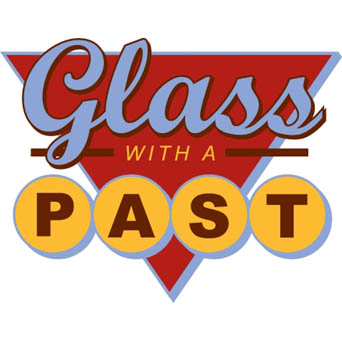Recently we looked at fusing mixed bottle glass and the internal stress that it causes in the glass due to incompatibility. That article is very popular, and I received a number of requests both to explain how to stress test your own glass, and if I could test a bottle glass frit fused on float glass combination. Both are great ideas, so I combined them in what will hopefully be a helpful guide.
Testing for Incompatibility
Setting up the fusing test
Start with the glass that will be tested, we’re using four pieces of float glass from the same sheet and bottle frit in 3 sizes.
Next I’ll put some of each frit size on a piece of float glass.
and fuse it using my full fuse schedule.
Notice that one of my float pieces has no frit. This is my control piece. A control is critical because we are looking for stress in the glass, and stress can be caused by incompatibility AND/OR annealing issues. By having a control piece, I can check it for annealing problems and eliminate that as a possible cause of glass stress.
Checking for Glass Stress
For this we will need a light box and two pieces of polarizing film.
My light box is an old X-ray viewer.
Turn on the light box and put one piece of film on it, then the glass, then another film. We’re making a kind of a film and glass sandwich.
A quick word about using polarizing film, the film has grooves (very tiny) that channel the light, and go in one direction. The top film has to be turned 90 degrees so the grooves go the other direction. When you do this, the surrounding film will go dark. If your test is completely lit up, turn the top film and see what happens.
Now let’s talk about what we are seeing here. The top right square of glass is our control. You can see there is no yellow flare so it is safe to assume that the glass is properly annealed, and the stress we are seeing in our test is incompatibility.
And it is, quite incompatible. Although the glass isn’t cracking to the visible eye, there is a lot of stress in the glass that makes it unstable. I would not sell any piece of glass with this amount of stress in it.
Here are some closeup photos of the stress caused by incompatibility.
The fine frit causes an even flare of stress.
The frit pieces here are large enough to see the individual stress halos around each piece, they look like squares in the photo
The large pieces of frit completely light up. Although all of these look different, they are all incompatible. Ideally, you would want all four of your squares to be dark in a stress test.
What this tells us? This bottle glass, *only* this one is tested incompatible. I strongly suggest that you test every kind of bottle glass frit that you use, some may actually be compatible. The only way to know is to test!
Key things:
- always have a control piece of glass
- test everything
- keep excellent notes and photos
Let me know if you start compatibility stress testing mixed glass and what you learn.
Related Articles:
Mixed Bottle Glass Stress Test
Diagnosing Cracks in your Glass
Related Products:
- Pin Me!













